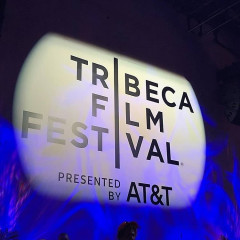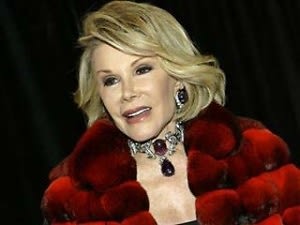 You only see Joan Rivers without makeup during Joan Rivers: A Piece of Work's opening credits. But that stripping away is sustained throughout, even if the documentary (playing at the Tribeca Film Festival), could use more unflattering close-ups and less near-beatification. -
You only see Joan Rivers without makeup during Joan Rivers: A Piece of Work's opening credits. But that stripping away is sustained throughout, even if the documentary (playing at the Tribeca Film Festival), could use more unflattering close-ups and less near-beatification. -
Directors Ricki Stern and Anne Sundberg follow Joan for a year in her life, from standup gigs at shabby downtown clubs (and one in Wisconsin) to her reluctant appearance on Celebrity Apprentice, which she won, to a lukewarmly received play that she'd hoped would earn her credibility among critics who, as Rivers puts it, "always make sure comedienne is proceeded by something, like crass or Borscht Belt", when they describe her.
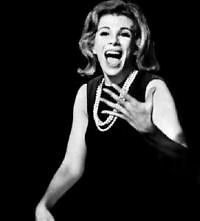 West End critics had good things to say about "Joan Rivers: A Work In Progress" her reflective one-woman show, but not enough to persuade her to move it to Broadway. One detected a "husky weakness" in Rivers' voice and another said that the energy dipped at the end, which was "understandable given her age." Rivers, who stresses that she's an actress first and considers stand-up a perpetual moonlighting gig, still smarts from the scathing reviews of "Fun City," her 1972 Broadway debut, and can't withstand another critical firing squad on her home turf. (She was raised in Larchmont and lives in an over-the-top gaudy Upper East Side penthouse, the sort of place "Marie Antoinette would have called home, if she'd had money."
West End critics had good things to say about "Joan Rivers: A Work In Progress" her reflective one-woman show, but not enough to persuade her to move it to Broadway. One detected a "husky weakness" in Rivers' voice and another said that the energy dipped at the end, which was "understandable given her age." Rivers, who stresses that she's an actress first and considers stand-up a perpetual moonlighting gig, still smarts from the scathing reviews of "Fun City," her 1972 Broadway debut, and can't withstand another critical firing squad on her home turf. (She was raised in Larchmont and lives in an over-the-top gaudy Upper East Side penthouse, the sort of place "Marie Antoinette would have called home, if she'd had money."
The play didn't save her reputation from the clutches of shilling on QVC or shrilling on E! red carpet coverage, which she describes thusly:
"Congratulations on being nominated! Who are you wearing? Now who the fuck are you?"
But the documentary, a straightforward and briskly edited mix of interviews with Rivers and her small inner-circle, her gigs (the most consistently amusing portion), and the highs and lows from her past and present, hopes to.
So we see how groundbreaking Rivers was in her early days. She was the first comic, man or woman, to joke about abortions, although she couldn't use the word itself so instead riffed on a friend who'd had "fourteen appendectomies, if you catch my drift, but wore white to her wedding." She was also the first woman with a prominent role on the late night talk show circuit, becoming Johnny Carson's guest host before a short-lived solo schmoozefest.
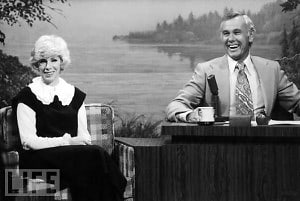 Rivers' move from Johnny's wingwoman to lone wolf infuriated her mentor so much that he never spoke to her again. Coming from a man who'd made her name, telling Rivers "You're gonna be a star" after her first appearance on his program, the rejection felt like a punch to the gut. As did her husband Edgar's suicide, which came shortly after the cancellation of her bid at individual late night superstardom. There's also a rift between Rivers and her longtime manager Billy Sammeth late in the film. (It's interesting that in Hollywood, even a pioneering female entertainer depends on a constellation of powerful men.) The split with Sammeth, a longtime friend and the only person she "can still share memories of Edgar with" leads to one of Joan's least guarded moments.
Rivers' move from Johnny's wingwoman to lone wolf infuriated her mentor so much that he never spoke to her again. Coming from a man who'd made her name, telling Rivers "You're gonna be a star" after her first appearance on his program, the rejection felt like a punch to the gut. As did her husband Edgar's suicide, which came shortly after the cancellation of her bid at individual late night superstardom. There's also a rift between Rivers and her longtime manager Billy Sammeth late in the film. (It's interesting that in Hollywood, even a pioneering female entertainer depends on a constellation of powerful men.) The split with Sammeth, a longtime friend and the only person she "can still share memories of Edgar with" leads to one of Joan's least guarded moments.
But back to the guard for a second. Stern and Sundberg don't skirt their subject's relentless plastic surgery procedures and the cartoonish result. There's no criticism of it, just a pat psychological explanation. Rivers on childhood conversations with her mother:
"Joanie, looks don't matter. Looks don't matter at all. Now get the hell out of my sight, you hideous cow."
There's also the reasonable argument from Joan's daughter Melissa Rivers that comics are among the planet's most desperately insecure creatures. Joan understands this and also the cruelty of showbiz, which she dissuaded Melissa from entering. Still, she acted alongside her daughter in a bizarre TV movie reenactment of Edgar's suicide and its wake. She calls the decision "sick," but you wonder if the directors' choice to brush off the maudlin and tasteless production as a harmless mistake borders on sycophancy.
Rivers maintains a jaw-dropping work ethic despite her qualms about the industry. Several massive filing cabinets contain meticulously organized index cards with just about every joke she's thought of in the last forty years. Some of the better cracks to emerge in A Piece of Work include Joan's take on Melissa turning down a $400,000 offer to go topless in Playboy:
"I'm so proud of you Melissa...you stupid cunt! If they'd given you another $200,000 you should have have shown your pussy!"
To her advice for Celebrity Apprentice co-star Annie Duke:
"She can kiss my Jewish ass. But not with those pig lips."
To the suggestion that some men value a woman's brains over her body:
"Look, no man has ever put his hand up a woman's skirt looking for a library card."
To immediately hitting the Marlboros and the booze after asking a nurse the most important questions about her newborn child:
"Is she breathing? Is she normal? Is she white? Phew."
At one point in the movie Rivers explains that her plastic surgery, her taking any crappy gig she can and her need to make everyone around her laugh stems from a simple wish "to be loved." And even if this documentary could use a bit more of the subversion or critique that makes Rivers one of the great stand-ups, A Piece of Work should help her get there.
Photo 1 via AP
Photo 2 via Photofest
Photo 3 via Life


.jpg)
.jpg)



.jpg)
.jpg)
.jpg)

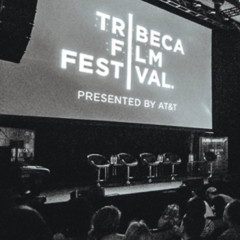
.jpg)
